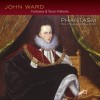| Country: | England |
| Period: | Renaissance |
Biography
John Ward (1590–1638) was an English composer.
Born in Canterbury, John Ward was a chorister at Canterbury Cathedral. He appears to have stayed in Canterbury until at least 1607 and then went to London where he served Sir Henry Fanshawe (1569–1616) as a musician. Fanshawe, who held the office of remembrancer of the exchequer, had a house in Warwick Lane, London, and a country house at Ware, Hertfordshire.
The Fanshawe family appear to have employed more than one person called John Ward (if so, the other was possibly the composer's father), which makes some details of the composer's life difficult to establish. One important stage in his career was the publication of his "first set" of madrigals in 1613. It was printed by Thomas Snodham and dedicated to his patron. His output includes at least one lament for Henry Frederick, Prince of Wales, who was on good terms with Fanshawe.
Sir Henry died in 1616. His eldest son and heir Thomas Fanshawe gave less support to the family's musical establishment. The remembrancership was put in trust for Thomas when he went abroad in 1618 to continue his education and he took up his duties on his return to England in 1619. The Oxford Dictionary of National Biography suggests that it was probably about this time ("and certainly by April 1621") that Ward obtained "a modest post" in the remembrancer's office.[1]
Ward married and had at least 5 children. Records show that he held property in Ilford Magna, Essex, where he died in 1638. However, he retained his job in the remembrancer's office in London until the year of his death.[1]
Ward composed madrigals, works for viol consort, services, and anthems. His madrigals are remarkable for their fine texts, broad melodic lines and originality.







